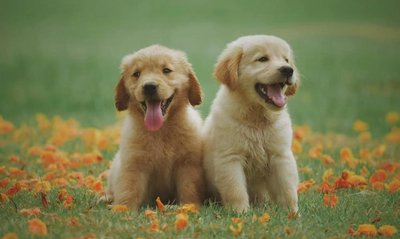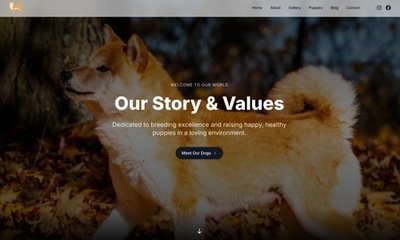Tuesday, March 25, 2025
•The Ultimate Guide to Raising a Golden Retriever Puppy: 10 Tips

Golden Retrievers are beloved for their friendly nature, intelligence, and affectionate personalities. These loyal companions make fantastic family pets, but raising a Golden Retriever puppy requires patience, training, and commitment.
From nutrition and training to health care and grooming, this guide covers everything you need to know to ensure your Golden Retriever puppy grows into a happy and well-behaved adult dog.
Golden Retriever Puppies: An Overview
Golden Retriever puppies are playful, energetic, and curious. They thrive on social interaction and need plenty of exercise, mental stimulation, and proper training. Their friendly nature makes them great companions, but they also require consistent guidance to develop good behavior.
Here’s a step-by-step guide to raising a healthy and well-adjusted Golden Retriever puppy.
1. Nutrition: What to Feed Your Golden Retriever Puppy
High-Quality Puppy Food
Choose a premium large-breed puppy food that contains the right balance of protein, fats, and essential nutrients to support healthy growth.
Feeding Schedule
- 8 weeks to 3 months: 3–4 meals per day
- 3 to 6 months: 2-3 meals per day
- 6 months and older: 1-2 meals per day
Avoid overfeeding, as Golden Retrievers are prone to obesity. Always provide fresh water.
Foods to Avoid
Never feed your puppy chocolate, grapes, onions, garlic, macadamia nuts, or foods high in salt and fat, as they can be toxic.
2. Training: Building Good Habits Early
Socialization
Introduce your puppy to different people, pets, environments, and sounds between 3 and 16 weeks old. Early exposure helps prevent fear and anxiety.
Basic Commands
Start training with simple commands like “sit,” “stay,” “come,” and “leave it.” Use positive reinforcement with treats and praise.
Potty Training
Take your puppy outside regularly, especially after meals and naps. Be patient and consistent to reinforce good habits.
3. Health Care: Keeping Your Puppy Healthy
Vaccinations
Your puppy will need a series of vaccinations to protect against diseases like parvovirus, distemper, and rabies. Follow your vet’s recommended schedule.
Routine Vet Visits
Regular check-ups help monitor your puppy’s health, weight, and development.
Parasite Prevention
Golden Retrievers are prone to fleas, ticks, and worms. Use vet-approved preventatives for year-round protection.
4. Grooming: Keeping Your Golden Retriever Looking Great
Brushing
Golden Retrievers have thick, double-layered coats that shed heavily. Brush your puppy 3–4 times a week to reduce shedding and prevent matting.
Bathing
Bathe your puppy once every 4–6 weeks or when dirty, using a mild dog shampoo. Overbathing can strip natural oils from their coat.
Ear & Dental Care
- Ears: Check and clean weekly to prevent infections.
- Teeth: Brush 2–3 times a week with dog-specific toothpaste to maintain oral health.
5. Exercise: Meeting Their High Energy Needs
Daily Exercise
Golden Retrievers are active dogs that need at least 1–2 hours of exercise daily. Walks, fetch, and swimming are great ways to keep them engaged.
Mental Stimulation
Provide puzzle toys, obedience training, and interactive play to prevent boredom and destructive behavior.
6. Establishing a Routine: Creating a Structured Environment
Regular Schedule
A consistent routine for meals, potty breaks, playtime, and sleep helps your puppy feel secure and well-adjusted.
Sleep Needs
Golden Retriever puppies need 18–20 hours of sleep per day to support healthy growth. Provide a quiet, comfortable sleeping area.
7. Socialization: Preparing Your Puppy for the World
Exposure to New Experiences
Introduce your puppy to various environments, sounds, and surfaces to build confidence.
Meeting New People & Pets
Allow your puppy to interact with friendly, vaccinated dogs and introduce them to new people in a positive manner.
8. Teething & Chewing: Managing Your Puppy’s Biting
Teething Timeline
- 2–4 weeks: Baby teeth begin to emerge.
- 6–8 weeks: Full set of 28 baby teeth.
- 2–16 weeks: Baby teeth start falling out, and adult teeth begin to grow in.
- 6–7 months: All 42 adult teeth should be in place.
Chew Toys
Provide teething toys to help soothe discomfort and prevent destructive chewing.
Biting & Nipping
If your puppy bites, redirect them to a toy and stop playtime if they bite too hard. Consistency is key to teaching bite inhibition.
9. Creating a Safe Home Environment
Puppy-Proof Your Home
- Remove electrical cords, small objects, and toxic plants from their reach.
- Keep cleaning supplies and medications securely stored.
Safe Play Area
Designate a space with appropriate toys to keep your puppy entertained and safe.
10. Separation Anxiety: Helping Your Puppy Feel Secure
Training Alone Time
Start with short periods of separation and gradually increase the time to prevent anxiety.
Comfort Items
Leave familiar toys, blankets, or an item with your scent to reassure your puppy when you’re away.
Frequently Asked Questions
🟡 How often should I bathe my Golden Retriever puppy?
Bathe them every 4–6 weeks or when dirty to avoid drying out their skin.
🟡 How much exercise does my Golden Retriever puppy need?
They need at least 1–2 hours of exercise daily to stay healthy and happy.
🟡 When do Golden Retrievers start teething?
Teething begins around 2–4 weeks, with adult teeth replacing baby teeth between 12–16 weeks. By 6–7 months, they should have all their adult teeth.
🟡 What if my puppy is chewing on furniture?
Provide chew toys, use deterrent sprays, and redirect them to appropriate chewing alternatives.
Final Thoughts
Raising a Golden Retriever puppy is a rewarding journey that requires time, patience, and commitment. With proper care, training, and socialization, your puppy will grow into a loving and well-behaved adult dog.
By following these guidelines, you’ll ensure your Golden Retriever stays healthy, happy, and becomes a cherished member of your family! 🐾💛
Are you seeking more expert advice? Visit LaunchPets Breeders to discover a professional Golden Retriever breeder!


